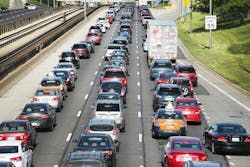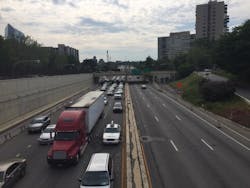Traffic congestion costs trucking over $63.4 billion, report finds
Traffic congestion on the U.S. National Highway System (NHS) added over $63.4 billion in operational costs to trucking in 2015, according to research released today by the American Transportation Research Institute (ATRI).
Utilizing a variety of data sources including its truck GPS database, ATRI calculated delay on the NHS totaling more than 996 million hours of lost productivity, which equates to 362,243 commercial truck drivers sitting idle for a working year.
ATRI's analysis also documented the states, metropolitan areas, and counties that were most impacted by these delays and subsequent cost increases. The top 10 states experienced costs of over $2 billion each, with Florida and Texas leading with over $5 billion each.
According to ATRI, traffic congestion tended to be most severe in urban areas, with 88% of the congestion costs concentrated on only 17% of the network mileage, and 91% of the total congestion costs occurring in metropolitan areas.
"Congestion-related costs continue to rise and impact our supply chains. A five-minute delay for each UPS vehicle, every day, costs UPS $105 million annually in additional operating costs. ATRI's report quantifies this drain on the economy which must be addressed through targeted infrastructure investments," said Rich McArdle, president of LTL operator UPS Freight, who also serves on ATRI's board of directors.As part of its analysis, ATRI said it applied the 2015 national average operational cost per hour (CPH) metric of $63.70 per commercial truck to the 996 million hours lost to traffic delays, which is how the group came up with the $63.4 billion in added industry operational costs due to traffic congestion.
Distributing this cost across the 11.2 million registered large trucks in the U.S. results in an average congestion cost per truck of $5,664, the group noted.
While the actual cost for any one truck is dependent on a variety of factors such as location of operation and operating sector, ATRI stressed in its report that it is possible to extrapolate congestion delays on a per truck basis using the number of miles driven annually.
Using the Federal Highway Administration’s (FHWA) 2015 total truck vehicle miles traveled (VMT) figures and the 2015 total cost figure, congestion costs were calculated to have increased by an average of $0.23 per VMT for large trucks, ATRI said.
This concentration of congestion has been documented in ongoing work by ATRI which annually identifies the worst truck bottlenecks in the U.S.
For the second straight year, the infamous "Spaghetti Junction," where Interstates 285 and 85 North converge outside of Atlanta, GA, was the top freight highway bottleneck in the U.S., according ATRI.
The group’s 2017 Top Truck Bottleneck List assesses the level of truck-oriented congestion at 250 locations on the national highway system; an analysis based on GPS data from 600,000-plus heavy duty trucks, several customized software applications, and what’s described as “terabytes of data” to effectively rank each freight congestion point.
The most recent traffic congestion report is available on ATRI's website.
About the Author
Fleet Owner Staff
Our Editorial Team
Kevin Jones, Editorial Director, Commercial Vehicle Group
Cristina Commendatore, Executive Editor
Scott Achelpohl, Managing Editor
Josh Fisher, Senior Editor
Catharine Conway, Digital Editor
Eric Van Egeren, Art Director

